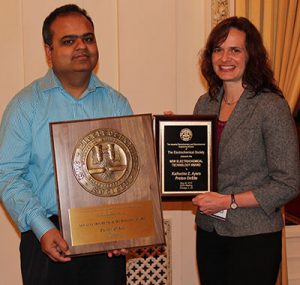Extended Deadline: August 31, 2018

2015 IEEE NET award winner Katherine Ayers of ProtonOnsite with Venkat Subramanian, past chair of the ECS IEEE Division.
Endowed by the Dow Chemical Company Foundation to recognize significant advances in industrial electrochemistry, the IEEE Division New Electrochemical Technology Award is the only award within the ECS Honors & Awards Program presented to an organization. The purpose of the award is to promote high quality applied electrochemical R&D and is intended to highlight novel electrochemical technology which has been practiced at a commercial scale.
The IEEE NET Award consists of a commemorative plaque (for up to six key contributors). The award will be presented at the IEEE Division business luncheon in spring 2019 and the winners will be asked to present a paper on the technology development during a division sponsored symposium. Recipients may receive travel assistance in order to attend the designated meeting. Organizations are encouraged to self-nominate and reapplication is allowed.
The award application must include:
- A designated officer must certify that all information contained in the application is non-confidential.This certification must be included at the beginning of the application, and must be the following: “I, (certifying officer, position with organization), certify that this application to the NET Award contains only non-confidential information (signature of certifying officer, date).”
- Completed electronic award form (please dedicate one member of the group as the contact person – same information for required nominee and nominator fields)
- Curriculum vitae for each contributor (combined in one document) that includes patent and publication lists
- Award criteria narrative – in no more than ten typed pages, provide specific and effective responses to the following criteria:
1. Non-confidential description of the nominated technology (include dates of the development and commercialization efforts;
2. Principal honors or citations won by the company or individuals associated with this technology;
3. Description of the impact this technology has had on the company, the environment, society in general, energy usage, etc.;
4. Description of how was electrochemical science applied to this technology;
5. What impact will this technology have on the future practice of electrochemical engineering?


